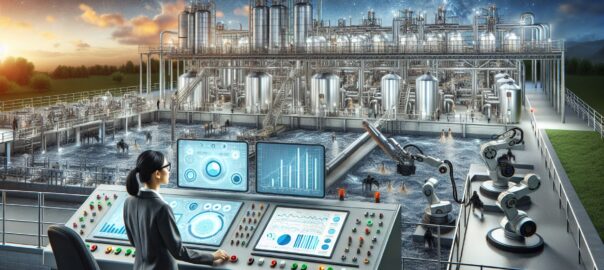Hello, lovely readers! Today, we’re diving into a topic that’s probably not on everyone’s daily pondering list, but it’s incredibly vital to our well-being and the environment: wastewater automation solutions. It sounds a bit technical, I know, but I promise by the end of this article, you’ll see just how fascinating and important this field is. So, buckle up and let’s explore the high-tech world that keeps our water clean!
What Are Wastewater Automation Solutions Anyway?
Wastewater automation solutions are like the brains behind the brawn of wastewater treatment plants. In essence, they’re a combination of software and hardware that control the various processes involved in treating wastewater. Think of them as the hidden heroes that ensure your community’s sewage is treated effectively, efficiently, and, very importantly, environmentally friendly.
Why Are They So Important?
-
Efficiency: These systems can monitor and adjust treatment processes in real-time. This means that they can identify issues and make improvements on-the-fly, which minimizes waste and maximizes the efficiency of the entire operation.
-
Environmental Impact: By fine-tuning the treatment process, automation solutions help in reducing the facility’s carbon footprint. Fewer chemicals and less energy consumption mean a happier Mother Nature.
-
Cost Savings: Efficient processes translate to cost savings. Automated systems help reduce operation costs by optimizing treatment cycles and reducing the need for manual labor.
-
Quality Control: Automation solutions ensure that the output, which is the treated water, meets the stringent quality standards set by regulatory bodies. This is crucial, as it prevents pollution and protects public health.
How Do They Work?
Wastewater automation solutions usually involve a few key components:
-
Sensors: These are the eyes and ears of the system, constantly checking various parameters such as pH levels, temperature, and chemical concentrations.
-
Controllers: Consider them the brains. They receive input from the sensors and, based on pre-set parameters, make decisions about the treatment process.
-
Actuators: These are the hands that carry out the controller’s decisions, adjusting valves, gates, and pumps to change the flow or treatment of the wastewater.
-
SCADA Systems: Standing for Supervisory Control and Data Acquisition, these systems oversee the entire process, providing operators with a high-level view of the plant’s operations.
-
Data Analytics: Modern systems also include sophisticated data analysis tools that help predict future patterns and identify long-term improvements.
Real-world Examples
Here are a few actual applications of wastewater automation solutions:
-
Smart sensors installed in sewers that detect potential blockages or leaks and alert operators before they become serious problems.
-
Predictive maintenance tools that analyze historical data to predict when equipment might fail, so it can be serviced proactively.
-
Energy management systems that adjust aeration rates (a big energy consumer in wastewater treatment) based on real-time demand, leading to big energy savings.
The Road Ahead
Wastewater automation solutions are constantly evolving. As new technologies emerge, such as the Internet of Things (IoT) and machine learning, the potential for even smarter, more responsive wastewater treatment facilities grows. Who knows? Maybe one day, plants will be largely self-managed, with drones and robots performing tasks and a small team of humans overseeing the operation from a high-tech control room.
To Wrap It Up
There you go, a glimpse into the world of wastewater automation solutions! It’s a field that combines engineering, computer science, and environmental science to protect our waterways and keep our communities clean and healthy. A big shoutout to all the engineers and scientists working in this field – we literally couldn’t live without you.
If this topic has piqued your interest and you want to dive even deeper, here are a couple of recommended sources to get you started:
-
Water Environment Federation (WEF) – for a comprehensive overview of the wastewater treatment industry and resources.
-
American Water Works Association (AWWA) – offering detailed information on water treatment and automation solutions.
-
International Water Association (IWA) – for global insights on water and wastewater management practices.
So, until our next adventure into the world behind the scenes of our everyday lives, stay curious and keep learning!
